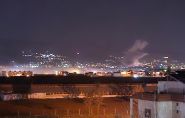
For everyone planning to spend their vacation in Lebanon, here is your survival guide to a country where nothing works, yet somehow everything does.
First of all, getting to Lebanon is no small feat. Plane tickets cost so much, you might as well be booking a business-class trip to Mars.
Let’s say you sold your house in France or Canada and finally secured that precious golden ticket.
First rule upon arriving at Beirut airport: avoid taxis like the plague. They’re not taxis, they’re rolling philosophical puzzles. The price? An existential riddle. They’ll offer you $80 for a 10-minute drive. A true Lebanese will call his cousin. Or the cousin’s cousin. Or some guy on WhatsApp with a 2009 Toyota Corolla who calls you “habibi” before even seeing you and says he’s waiting at parking B5 while he has not yet departed from his station.
Once you’re in the city, welcome to the roads. Or rather, the nightmarish maze of GPS apps that’ll have you going around the same roundabout for 20 minutes. No signs, outdated lighting (which means none at all), and road markings that look like they belong in a psychedelic escape room. Still, everyone somehow manages to get where they need to go. Even you. Really. Just roll down your window and ask anyone nearby. They’ll be happy to point you in some direction, even if they have no idea where you’re actually heading.
The best part? As you travel through neighborhoods that in Europe would politely be called “sensitive,” you’ll see faded buildings, rusted metal, antennas about to collapse—and brand-new air conditioners! Yes, in Lebanon, even the slums have air conditioning. While Europeans panic when temperatures hit 34 degrees, Lebanese people sleep under blankets with the AC blasting at 18 degrees.
The restaurants? Always full. No matter the time. The economic crisis? Sure, it’s hitting most Lebanese hard. But then again, who are all these people filling up every single table? At the door, the welcome is friendly but firm. “Walaw! You didn’t book! It’s fully booked.”
Lebanese don’t eat to live. They eat to forget the endless list of problems waiting for them as soon as the sun rises. That’s just how it goes. And it works. Because honestly, a plate of kibbeh nayyeh with a crunch of raw onion for extra kick is what calms your existential fears.
Let’s talk electricity. Or rather, the concept of electricity. Life in Lebanon means juggling between private generators, and a red button that signals when the “dawleh” power (that is, the state’s) is on, plus subscriptions to people you don’t know but respect like warlords. And yet, Netflix keeps streaming, TVs stay on and the coffee stays hot. People get two electricity bills every month: one official, and the other for the “moteur,” the neighborhood generator.
In the streets, it’s every man for himself, unless it’s every man for all. When trouble hits, a dozen people appear out of nowhere to help. But in traffic jams, brace yourself for hell. Everyone honks, cuts in on the right, invents a third lane and throws affectionate insults at other drivers. Yet somehow, everyone still makes it to their destination, more or less in one piece.
As for safety, Lebanon might be teetering on the edge, or perhaps the bottom of the abyss, but it’s still far safer than most major European capitals. No thefts in the metro (easy to say, since there isn’t one), few assaults on the streets, even at 3 AM. Military checkpoints are everywhere, but the soldiers smile and say “tfaddal” (please, go ahead).
As for money, it’s like playing Casino Royale: two currencies in circulation, prices sometimes listed in dollars, sometimes in Lebanese pounds and sometimes coded. Yet somehow, everyone understands, except you. No worries. You’ll soon learn to divide by 89,600 (the exchange rate for one dollar in Lebanese pounds). Even those who struggle with math manage to figure it out.
Lebanon is a patchwork of religious communities. Every neighborhood has its own identity. Without a map or guide, you just know. You feel it. And if you don’t, you ask, “Where are you from?” Translation: “What’s your religion?” It’s a kind of instant, 100% local anthropology.
The food? No health inspections. None whatsoever. Yet after the obligatory initial bout of “tourista,” like a passage rite, very few people get seriously sick. You eat raw meat, tripe, fish caught in suspicious waters and ice cubes made in questionable conditions, and somehow, everything turns out fine. Go figure.
In Lebanon, the weather’s great. So naturally, it’s off to the beach. No way around it. Don’t even think about the public ones: they’re dirty and have no facilities. So you head to the private beaches. Entry is seriously expensive. Better plan for an international wire transfer just to spend the day lounging.
And then there’s real estate. Nobody buys homes in Europe anymore because, “you know, interest rates are at 3%.” Here, there are no mortgages—you pay cash. Against all economic logic, offers are ridiculous, prices are crazy high, yet there’s always that gold rush feeling. Because the Lebanese, even when broke, invest in property. It’s psychological. It’s comforting. It’s concrete!
And if you really want to get lost, try jumping into a conversation about local politics. Every one of Lebanon’s 4.5 million people has a complete, personal and passionate opinion about the country and the region. Opinions that couldn’t be more different from one person to the next.
So no, don’t try to figure out how this country works. It doesn’t. It exists. It buzzes, it honks, it shouts, it eats, it loves, it suffers…but it still stands tall. That’s Lebanon: a constant paradox, a sublime absurdity. And a life lesson for anyone who still believes everything has to make sense to be beautiful.




Comments